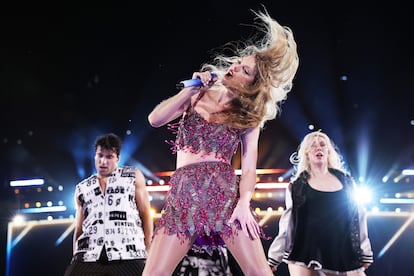The war between Universal and TikTok shakes the music consumption model
The record giant is removing thousands of songs from the Chinese social network, which has become an essential channel to promote artists


The success of the Spanish singer Íñigo Quintero cannot be explained without TikTok. His song Si no estás became the soundtrack for thousands of romantic videos on the Chinese social network for weeks; from there he made the jump to Spotify, where, with a fan base in the millions, he reached the top of the global chart. The TikTok launch pad has also been responsible for boosting hits by big stars like Rosalía, Taylor Swift, Aitana or Harry Styles. However, this way of succe—eding is disappearing for many artists. The open war between two major players in the music industry Universal Music, the most powerful record company, and TikTok, the social network where current hits start to gain momentum — is becoming increasingly intense.
A month ago, the company, which owns a third of the world’s music, removed some of its songs from the social network; now, it intends to delete them all, due to a dispute that revolves around the percentage paid for copyright. While artists like Bad Bunny, Taylor Swift and Rosalía are being affected, other third parties are being benefited by the conflict: part of the success of Texas Hold Em’, Beyoncé's country song, stems from the fact that Sony, her record company, does have an agreement with TikTok, which is now full of videos of TikTokers dancing to the diva’s latest song.
Currently, multinational record companies base their business on receiving millions of dollars from streaming platforms such as Spotify, Apple, YouTube Music or Amazon Music. The negotiations of these contracts are intense, but an agreement is eventually reached. This is the first time that Universal goes to the extreme of ordering its music to be removed from a digital platform. This decision sets a precedent that can affect the negotiations of multinationals with other platforms, especially Spotify, the most popular service of its kind. It is an old fight over percentages: both record companies and artists demand a bigger piece of the pie from Spotify. On the other hand, a rumor has been going around for a while that TikTok is planning to set up a music streaming platform to compete with Spotify.
The meetings between TikTok and Universal began a year ago, when the contract expired, and in all that time they did not reach an agreement. Tensions increased when, a month ago, Universal deleted part of its catalog from TikTok. By Monday, they upped the ante: the company also deleted the songs whose publishing rights belong to Universal. Songs have two kinds of copyrights: the recording rights (the album) and the publishing rights (the writing and composition). It is not uncommon that both are owned by different parties. An example: Despechá, by Rosalía, was recorded with Sony, but the publishing rights belong to Universal, so the Spanish singer’s hit will be removed from TikTok.
@ladygaga Driving home from set 🃏❤️ my song came on the radio 😭
♬ original sound - heyy
According to Financial Times, TikTok may lose between 60% and 80% of its music. Although the platform claims that the percentage is not that high, their executives have reached out several times to Universal since the measure was applied in an attempt to come to an agreement. TikTok has become a basic channel in the launch and growth strategy of commercial songs. Lady Gaga’s Bloody Mary was the most listened to song in December 2022, even though the song was released in 2011. Why were people listening to a song that came out 11 years earlier? Because a TikTok user uploaded a video from the Netflix series Wednesday in which the protagonist’s movements matched the music; that triggered the views. It is these profiles that, by creating or replicating the choreographies of others, establish trends that make them go viral.
According to a study by the analytics firm MRC Data, 67% of TikTok users search for songs on streaming platforms after hearing them on the social network, doubling the number of active Spotify profiles worldwide. However, the numbers are not enough for Universal, which demands greater compensation for its artists (they claim that TikTok offers less than the 20% they get from other platforms), more protection against artificial intelligence and tougher rules against hate on social media. In a statement, TikTok expressed its disappointment with the company’s decision, but added that Universal will lose the “free promotional and discovery vehicle” that the platform represents.
Although this newspaper has not received any response from Universal, in the open letter it published a month ago, the company assures that the benefits they obtain from the social network are less than 1% of their total revenue. What the record company does not make clear are the indirect results generated by the virality that TikTok provides. For example, the consulting firm Midia Research points out that 26% of people between 20 and 24 years old attend concerts by artists they discovered through viral videos.
@alexchentsov Vamos s hacer edta baile cada dia hasta que se haga viral 😁
♬ DESPECHÁ - ROSALÍA
In this power struggle, the collateral damage has a name: the users. Especially those who use social media as a business, also known as tiktokers. It is they who create the choreographies that help the songs go around the world, and the only recognition they get, says Alejandro Chentsov, is €14 ($15) for every million visits. He lives in Spain with his daughter Arina, and they created the dance to the song Despechá, by Rosalía. The artist debuted the song in a concert before even releasing the studio version; the day after the concert, Alejandro and his daughter performed a choreography with the music of Despechá and it went viral, making part of the TikTok community dance and even managing to make the leap from the screens to the nightclubs, where young people recreated their steps. Then, after its success on TikTok, Rosalía officially released Despechá.
“At that moment it would have been enough for us to meet Rosalía in person, but now, come to think of it, we think that she has gained a lot and we haven’t even gotten a hello,” complains Chentsov, who is upset because during all this time there have been artists who have shared their choreographies and have succeeded without giving them credit, and now their songs are being deleted because of the war between TikTok and Universal. “They haven’t thought about us. In the end, what we do is also work, it helps them, and they are not recognizing it,” he explains. His Despechá video has garnered 3.3 million views.
The only effort the companies have to make to have all this advertising is to add the name of the person who created the dance in the video that the singer uploads to TikTok to respect their copyright. Without investing money. This way, everyone wins: the artists have their songs go viral; the tiktokers get recognition, views and followers; and the social network acts as an intermediary whose role is to ensure compliance with copyright and intellectual property laws, benefitting from the efforts of the other two parties. Specialized lawyer Rocío Colás believes this tacit agreement is enough to keep the peace and prevent complaints. “All actors must ask each other for permission to use the artistic creations of the others, and they must make their authorship clear to obtain an economic return. But since everyone benefits from the rest, no one takes the first step,” she says. Spanish tiktoker and choreographer Sergio Poveda, however, points his finger at TikTok: “Your idol mentioning your name may be exciting, but that doesn’t put bread on the table. The app profits from our work, and they should recognize it better.”
Sergio Poveda and two friends put rhythm to Bizarrap and Shakira’s music session. The Colombian singer uploaded a video with the choreography made by these three friends, and thousands of users shared it, but no credit was given to the authors. There is nothing unusual about this: few artists give recognition to the creators, because finding the one who first danced to their song can be a strenuous task. Spanish tiktoker Nadia Vilaplana shares a solution that can be used to let people know that the dance is yours, but that now, with the recent news from Universal, also becomes a back door through which to sneak the music of the record company: “You can upload a video with your own audio [music from a sound system in the background], and that song becomes a sound that everyone can use and that everyone can name what they want.”
By leaving TikTok, what Universal will lose is virality, although it can gain credibility, because the social network has changed the way that songs are written, with artists focusing all their efforts on creating 15 powerful seconds that capture the attention of the users, “even if the rest of the song is shit,” jokes Spanish singer Paula Mattheus. For her, virality is an element that Universal artists can afford to lose because most of them are already established. “What makes this decision dangerous is that it sets a precedent,” she says. Many emerging artists like her or Íñigo Quintero have seen their careers grow exponentially thanks to TikTok. Still, “it’s not the end of the world. There were emerging artists before TikTok, and they will keep growing after TikTok,” she concludes.
Sign up for our weekly newsletter to get more English-language news coverage from EL PAÍS USA Edition
Tu suscripción se está usando en otro dispositivo
¿Quieres añadir otro usuario a tu suscripción?
Si continúas leyendo en este dispositivo, no se podrá leer en el otro.
FlechaTu suscripción se está usando en otro dispositivo y solo puedes acceder a EL PAÍS desde un dispositivo a la vez.
Si quieres compartir tu cuenta, cambia tu suscripción a la modalidad Premium, así podrás añadir otro usuario. Cada uno accederá con su propia cuenta de email, lo que os permitirá personalizar vuestra experiencia en EL PAÍS.
¿Tienes una suscripción de empresa? Accede aquí para contratar más cuentas.
En el caso de no saber quién está usando tu cuenta, te recomendamos cambiar tu contraseña aquí.
Si decides continuar compartiendo tu cuenta, este mensaje se mostrará en tu dispositivo y en el de la otra persona que está usando tu cuenta de forma indefinida, afectando a tu experiencia de lectura. Puedes consultar aquí los términos y condiciones de la suscripción digital.








































